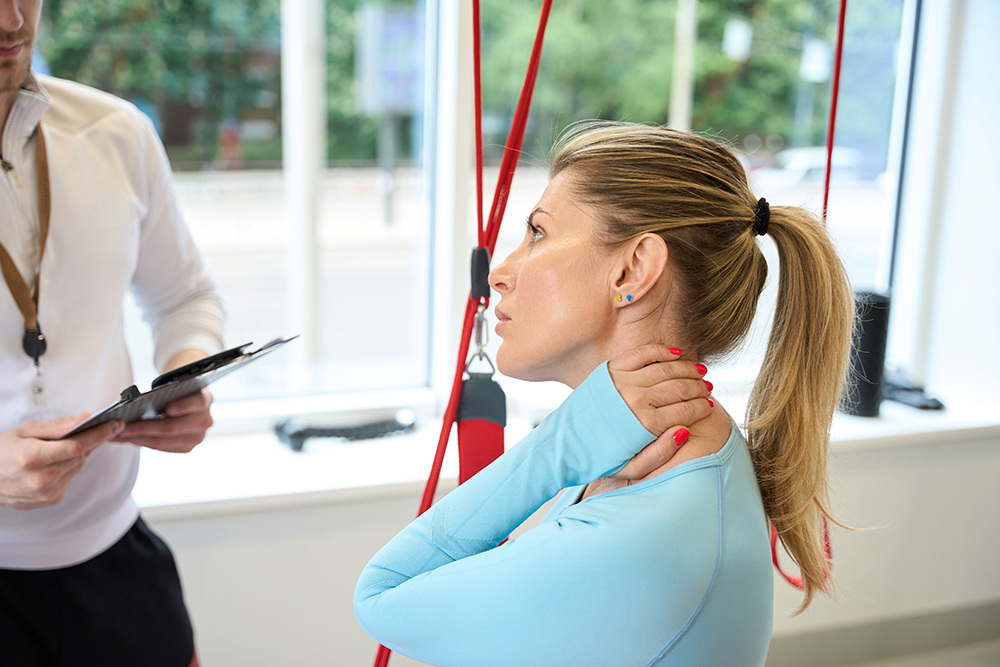You’re bound to crack your joints every once in a while, whether it be on purpose or by accident. It’s possible to “crack” or “pop” most joints in the human body, but some are more common than others, such as your knuckles or your neck.
If you feel like your neck is cracking an unusual amount lately, it’s normal to question the cause. By learning about possible reasons why your neck is cracking, you can determine if there’s a call for concern and if you need to treat the issue.
We’ll talk about what it means to crack your neck, potential reasons why your neck is cracking so much and treatment options that may help.
What it means to crack your neck
Where the bones meet in your neck, there are joints that can sometimes hold air. Cracking or popping your neck means that you’re moving your neck in a way that causes pressure to be released from inside your neck joints, making a popping or grinding sound, known as crepitus. It can also occur from nearby ligament or tendon movements as well as gas bubbles giving way.
Cracking your neck can often provide temporary relief from neck stiffness or pain. It can also release endorphins in your brain, which are neurotransmitters that boost your mood. Cracking your neck can be done by many types of movements, such as twisting or stretching.
While cracking your neck every once in a while is harmless, it can cause issues if it’s a regular occurrence. Cracking your neck too often or too hard may lead to:
- Pinched nerves.
- Muscle strains.
- Osteoarthritis.
- Punctured blood vessels.
3 reasons why your neck is cracking so much
Releasing the pressure in your joints can feel good, but if your neck is cracking more than usual, it’s possible that there’s a reason behind it. You should also take note of any symptoms that are occurring alongside the neck cracking, such as decreased range of motion, lightheadedness and numbness.
Here are three reasons that may explain why your neck is cracking so much:
- Hypermobility — If your neck has a wider range of motion than normal, it’s called hypermobility. Along with constantly feeling the need to crack your neck, hypermobility in your neck can also cause balance problems, headaches and neck muscle spasms.
- Injury — If you’ve sustained an injury or trauma that affects your neck, such as whiplash, it may cause it to crack more than usual. In many cases, this is normal and doesn’t interfere with your recovery process, but you should talk to your health care provider if you’re also experiencing neck pain or numbness.
- Cervical spondylosis — Arthritis can occur in nearly every joint of the body, including the neck. The most common type of arthritis that can develop in the neck is cervical spondylosis. It means that you’ve had gradual wear and tear on your cervical spine. It’s sometimes referred to as degenerative arthritis of the spine.
How physical therapy can help when your neck is cracking so much
If you feel like your neck is cracking a lot, a physical therapist can help you determine the possible cause so that you can explore potential treatment options that may help. There are some physical therapy treatments that can help alleviate the issues that’s causing the crepitus, while others help the symptoms that may occur alongside them, such as neck stiffness.
The goal of physical therapy for necks that are cracking too much is to alleviate the pain it may cause while also increasing the neck’s overall strength, flexibility and stability.
Here are some ways that physical therapy can help when your neck is cracking so much:
- Therapeutic exercise — By strengthening your neck muscles, you’re increasing the neck joints’ stability and support. A physical therapist can walk you through safe and effective exercises that will strengthen and stretch the muscles in your neck to decrease stiffness, which often leads to crepitus.
- Manual therapy — There’s an effective manual therapy technique called soft tissue mobilization that can help reduce muscle tightness that contributes to crepitus. The physical therapist will use their hands to manipulate the muscles with gentle massage-like movements and release the tension.
- Posture correction — Poor posture may contribute to your crepitus, as hunched shoulders or overextending your neck could put additional strain on the muscles. A physical therapist can help you develop proper posture with gradual adjustments to help your neck in the long term and reduce crepitus.
Specialists in Sports and Orthopedic Rehabilitation can help when your neck is cracking too much
It’s easy to brush off your neck cracking every now and then, but if it starts happening too much, you should consider exploring physical therapy. It can help you determine the possible cause behind your neck cracking and create a personalized treatment plan to help reduce it in the future.
Contact our team today to discover more information about all our PT services or to set up your initial appointment with us.
